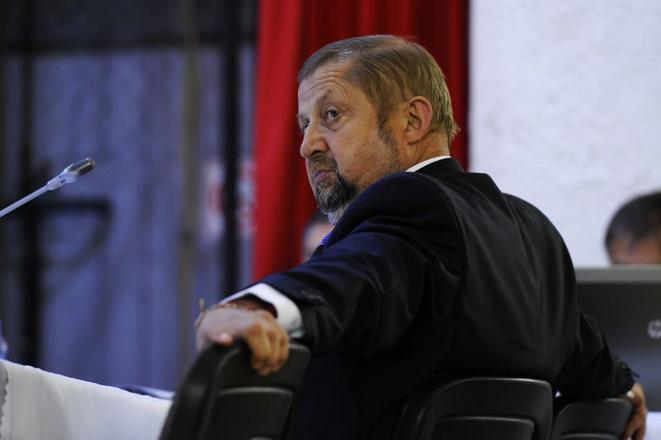The situation surrounding Judge Štefan Harabin arose following media reports that two different senates of the Supreme Court had handed down two contradictory rulings in a case involving the Interior Ministry’s inspectorate. One of the senates, headed by Harabin, a former Supreme Court boss, claims that the inspectorate itself violates Slovak laws. As a result, a former police officer whom the Specialised Criminal Court had convicted for corruption was released.
The ruling, along with another recent ruling that resulted in the release of a man convicted of sexual violence, could cost Harabin his post as the head of the Penal College of the Supreme Court, as not only his fellow judges but also politicians, including Justice Minister Tomáš Borec, charged that the verdicts of Harabin’s senate were based on “wanton arguments”.
Borec does not rule out disciplinary case
Minister Borec suggested that this could be the case, when he claimed that the Penal College should deal with the controversies and “its members should consider also the question of maintaining the good reputation and dignity of the Penal College in the event the term of its current chairman continues”, he stated.
In his statement, provided to The Slovak Spectator by ministry spokesperson Alexandra Donevová, the minister also labelled Harabin’s claims “confusing” and “legally ungrounded”, and his arguments “high-handed”.
By using such arguments, Harabin is not aiding justice, but rather creating conditions for releasing criminals who have already been convicted in line with the law, the minister stated.
“Therefore, [the minister] appeals to the judiciary for all competent persons to deal with the said situation and consider the possibilities of how to contribute to the protection of the trustworthiness of the Supreme Court in this situation,” the statement reads.
At the same time, the minister did not rule out that he might use his legal options to initiate disciplinary proceedings.
The verdicts
A senate led by Harabin recently issued two controversial rulings that drew attention to the former head of the Supreme Court.
In the case involving the Interior Ministry’s internal affairs inspectorate, the so-called Pribelský file, Harabin’s panel released a police officer convicted for corruption because it found the inspectorate to be in violation of the law.
In another case, the senate released a man convicted for sexual molestation by Veľký Krtíš District Court judge Milan Varga, because it decided that Varga was on the bench illegally. Milan Varga was convicted in the Czech Republic in 2011 for driving under the influence and, under Slovak law, a judge sentenced for any intentional crime should lose their post. In 2011, however, DUI was defined only as a misdemeanour and not a serious offence in Slovakia.
Interior Ministry intervenes
In the case involving the Interior Ministry’s inspectorate, the senate including Štefan Harabin argued that the very existence of the inspectorate under the minister is not in line with the law. The inspectorate, which investigates accusations against police officers, was moved from the Police Corps Presidium under the auspices of the Interior Ministry in 2007, when the current minister, Robert Kaliňák headed the department. A further shift in 2010, under Daniel Lipšic, brought police inspectors directly under the minister.
“The subject in the penal proceedings, regarding the criminal prosecution of police officers, is not the investigator of the police corps, but they called it sort of investigator of the Interior Ministry,” Harabin said, as quoted by the public-service broadcaster RTVS. “But the penal order does not recognise the notion of the Interior Ministry. We are the only EU country to have the inspection service under a politician. Why don’t we have all the cases clarified?”
Interior Minister Kaliňák, however, maintains that Harabin’s was “an arbitrary ruling in an effort to solve one’s personal problems”, the SITA newswire quoted him as saying. He said he intends to seek to overturn the ruling. On July 1 he said he would turn to General Prosecutor Jaromír Čižnár and ask him to submit a special appeal against the verdict.
“The arguments are on our side,” Kaliňák said, as quoted by the TASR newswire, referring to the provisions of the Criminal Code, the law on police, and the law on state service of police officers, arguing that the ministry has legal analysis that confirms its stance.
Meanwhile, Čižnár has already ordered the penal department of the General Prosecutor’s Office to scrutinise the ruling to see whether it meets conditions for submitting a special appeal.
The various – and varied – rulings
Some observers have expressed concern that the controversial ruling might provide an argument for convicted police officers seeking to be released. In fact, the argument about the inspectorate being in violation of the law was used in early July at the Žilina Regional Court by the attorney of a former police officer who is being tried for a series of robberies, as reported by the Pravda daily.
The whole affair is yet more complicated, as there are actually three rulings about the police inspectorate. One from late May 2015, by a senate of Štefan Harabin, dismissed the inspectorate as unlawful, and one from October 2014, by another senate, a senate of appeal, also headed by Harabin, by contrast did not have a problem with the inspectorate and labelled it a rightful body in the proceeding.
Additionally, there is the ruling of a senate composed of Juraj Kliment, Milan Karabin, and Peter Szabo, critics of Štefan Harabin, who ruled in June 2015 that the inspectorate is in line with the law.
“Our senate has only identified itself with [Harabin’s] ruling from October 2014,” Judge Juraj Kliment who headed the senate, told Pravda.
To resolve the situation with conflicting rulings, the Supreme Court President Daniela Švecová should now ask the Penal College to unify the opposing rulings. Unification is a procedure in which the whole college votes on the final ruling.


 Štefan Harabin (source: SITA)
Štefan Harabin (source: SITA)